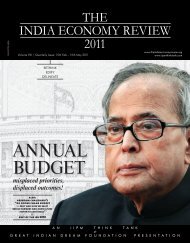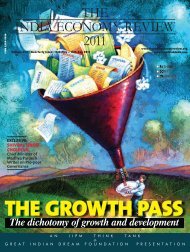Download - The India Economy Review
Download - The India Economy Review
Download - The India Economy Review
You also want an ePaper? Increase the reach of your titles
YUMPU automatically turns print PDFs into web optimized ePapers that Google loves.
in such times. <strong>The</strong> other institution was<br />
that of the market. <strong>The</strong> market brought<br />
with itself a number of issues which were<br />
quiet clear when a comparative picture<br />
was drawn of those economies that had<br />
developed markets and those that had<br />
only nominal ones. Underdeveloped<br />
economies and underdeveloped markets<br />
seemingly share a sine qua non relationship<br />
inimical to economic development.<br />
<strong>The</strong> State and Market relationship had,<br />
then, a validity that needed to be accounted<br />
for. If these were some of the<br />
important institutions, then there were<br />
certain methodologies that were required<br />
to be put in place so as to provide a manner<br />
to address these as part of a common<br />
framework. Economic planning was an<br />
early answer as the bridge between the<br />
State and that of market. <strong>The</strong> role of the<br />
State in forging the relationship by adopting<br />
this bridge was an activity of essence.<br />
<strong>The</strong> State in <strong>India</strong> opted for this as part of<br />
its intervention in the politico-economic<br />
landscape. It did so by setting up the Planning<br />
Commission, and also made this institution<br />
organizationally relevant by relating<br />
it to the political leadership in<br />
charge of deciding on construct of economic<br />
policies expected to engender the<br />
process of economic development. Planning<br />
for the economy was a critical input,<br />
and the State soon after independence<br />
took steps to institutionalize the process<br />
of planning for the economy as part of the<br />
economic development process.<br />
<strong>The</strong> prospects of what are identifi ed as<br />
‘market failure’ and that of ‘government<br />
failure’ were aspects that could well happen<br />
on putting the stated State, market<br />
and economic planning troika-schema<br />
into practice. <strong>The</strong>se were concerns not<br />
just for select nation states as <strong>India</strong>. <strong>The</strong>re<br />
were issues that were faced by emergent<br />
nations across the world at those points in<br />
time. Where the differences between na-<br />
tion states emerged as issue of conse-<br />
quence was in that of the specifi c historic-<br />
ity of each of these nations. <strong>The</strong> historic<br />
specifi city of <strong>India</strong> emerging from long<br />
period of direct colonial rule was different<br />
from that of Korea which had a compara-<br />
tively much shorter period of Japanese<br />
rule. Nonetheless, in both instances the<br />
role of the State in relating with the market<br />
and the adoption of state planning in<br />
matters economic are very much in evidence.<br />
Historic evidence also points out<br />
that the pattern in which this eventually<br />
worked out was quiet different in one nation<br />
state over that of the other. <strong>The</strong> manner<br />
of intervention that the combination<br />
of State, market and economic planning<br />
was structured, that is the combinatorial<br />
input, was specifi c to a nation state and<br />
the results that were realized say in terms<br />
of the changes in per capita income confi<br />
rm this in good measure. 1 <strong>The</strong> role of<br />
each of the combinatorial input is important,<br />
and so is that of the effect that the<br />
I NTEGRATED PLANNING<br />
combinatorial input has when brought in<br />
as a whole. <strong>The</strong> manner in which economic<br />
planning was leveraged by the State<br />
to both intervene and as also to develop<br />
the market was a critical one.<br />
Economic Planning —<br />
Issues that Play a Critical Role<br />
A superfi cial reading of economic planning<br />
as a mode of intervention by the<br />
State would mean taking an instrumentalist<br />
view of that which is meant to be associated<br />
with planning. Economic planning<br />
need not be brought down to a level<br />
of being a mode of an instrumentalist intervention<br />
alone. Viewed as such, the essence<br />
dwindles to one of methodology and<br />
we are presented with an approach that<br />
Economic planning was an early<br />
answer as the bridge between the<br />
State and that of market in <strong>India</strong><br />
gets limited to the richness, or the lack of<br />
it, of that methodology. In an early paper,<br />
Hayek initiated a debate on economic<br />
planning2 . And he did so by asking a question,<br />
and which was as to, ‘What is the<br />
problem we wish to solve when we try to<br />
construct a rational economic order?’ 3<br />
Hayek alluded that if looked at using common<br />
suppositions, that is the instrumentalist<br />
format referred to here, the answer<br />
is not far and it is amenable to logical inference.<br />
What is implied is that in case we<br />
have all the appropriate information<br />
about what society wants, and also the<br />
obtainable ways and means to address<br />
these, the economic calculus to be adopted<br />
for addressing the economic problem<br />
posed is not a diffi cult one to resolve. <strong>The</strong><br />
error in methodology is in the assumption<br />
that we know the blueprint in which allo-<br />
THE INDIA ECONOMY REVIEW<br />
33





